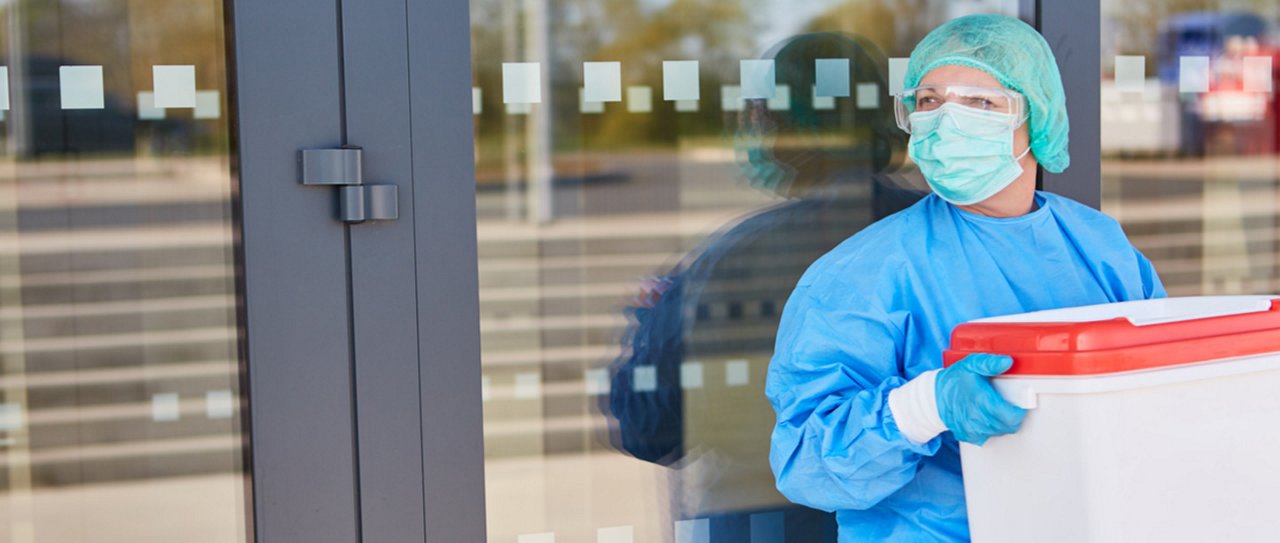Katie was in kidney failure. A phone call two years later saved her life.

On the day of Katie Scott’s wedding, she was in kidney failure. You’d never know it by the photos – she’s a vision in ivory tulle and lace, with strawberry blonde curls cascading over her shoulders and her new husband Shaquan beaming by her side.

But when Katie and Shaquan vowed to love each other in sickness and in health, their promise to each other carried a significance that most couples their age could only imagine. The genetic kidney disease Katie had lived with for 29 years had recently caused her kidneys to shrivel almost into oblivion. She would have to go on dialysis until she could get a transplant.
“My husband and I, when we found out I was going into dialysis, we wanted to have a big wedding,” she said. “I told him, ‘I don’t want to be on dialysis on my wedding day.’”
Shortly after the wedding, Katie and Shaquan’s new reality set in. Their one-bedroom apartment was filled with medical machinery. Dozens of boxes of dialysis fluids lined the living room walls. For nine hours every night, Katie was bound to her bed, connected by tubes to the machine that filtered and drained the toxins from her blood.
Once active and healthy, Katie now felt fatigued and foggy. Being in kidney failure caused short-term memory loss. When Shaquan would bring up conversations they’d had hours or days before, Katie would have no recollection. She’d start to do something, and her mind would just go blank.
The dialysis took a toll on her mental health, too. Some days, Katie felt like a prisoner in her own home.
Before she went into kidney failure, she had been working full-time with special needs children. She was studying to become a paralegal and was active in the local theatre scene. She dreamed of starting a family. One by one, those dreams got put on hold indefinitely.
“I didn’t anticipate how draining dialysis and kidney failure would be,” she said. “It was mentally and physically exhausting. You feel sometimes like you’re just fighting to stay alive every day. It’s life support. It’s not like living.”
In North Carolina, patients can wait up to seven years to receive a kidney. To Katie, that seemed like an impossibly long time, especially as the dialysis became less and less effective.
Then, after two years, she received the call she had been waiting for. It came in at 3 o’clock in the morning, and she woke to a message: “We think we have a kidney for you.”
"We think we have a kidney"
It was too early to get excited. She was a “backup” recipient, meaning there were two people in line ahead of her for this kidney. Katie knew from online support groups that some people got five or 10 phone calls like this before an organ came through. She packed a hospital bag just in case. But, she said, “with transplant patients, it can be a year of that. A year of packing the bag and being ready to go.”
While she waited for a follow-up call, she weighed her options. This kidney was an “increased risk” organ, which meant the deceased donor had engaged in some behaviors that could increase the recipient’s chances of getting certain infections.
But the benefits of Katie’s dialysis were starting to wane. Soon she would need 12 hours of dialysis a day instead of nine. After talking to her husband and family, she decided that, if the kidney was offered to her, she would take.
“We were ready,” she said. “But to be honest, I thought I had two more years on the list.”
That afternoon, she received another unexpected call.
“The kidney is yours,” the transplant coordinator told her. “You are going into surgery tomorrow.”
It didn’t seem real. But on September 30th, 2020, Katie and Shaquan arrived at Wake Forest Baptist Medical Center, where she was prepped for surgery.
“We were both really nervous. There’s a video of me right before they roll me back, and I’m about to cry. Nervous tears, scared tears, grateful tears,” she said. “But I got messages all day from people, and I have a big family who was praying for me. It was a very surreal experience.”
After seven hours in surgery, Katie woke up in the ICU with staples in her stomach, two draining tubes in her abdomen, an IV in her arm… and a working kidney.

Her first reaction was fear. Shaquan wasn’t allowed to spend more than three hours at a time in the hospital due to COVID-19, so Katie woke up alone and in pain. But soon the realization that she had a healthy kidney set in. In less than 12 hours, her kidney function levels had improved tenfold.
“It was wild. I remember being super grateful and just feeling amazing even though I had just had surgery,” she said. “My brain felt better, if that makes sense. I was so clear-minded. It just felt like everything was working.”
As soon as she could walk on her own, Katie was released from the hospital. Shaquan helped her recover at home, and she had regular visits with her doctor for the first month. While most people would struggle through recovery from such a complex surgery, Katie felt better than she had in years.
“Even through the whole recovery process, I told my husband, ‘I feel like I’m 21 again!’ I feel like a teenager,” she said. “I had so much energy running through my body. We were just really excited. And I could sleep through the night again without feeling like a prisoner in my bedroom. The moment they took that last tube out of my body, that was a magical moment.”
"They gave me my life back"

Now, one year later, Katie is filled with hope. She’s working with special needs families again. She’s set to graduate with her paralegal degree this year. She runs her own candle business and has started weight training to get healthy and fit. And she and Shaquan are talking to her doctor about starting a family.
“We really wanted to start a family, but we couldn’t do that. When you’re that sick, you can’t bring a child into that situation. But now we’re talking with my doctor about me possibly getting pregnant, so we’re really excited,” she said. “If my numbers are good in a year, we can talk about it.”
It’s not all easy. The post-transplant meds cause side effects of their own, and in 10 to 12 years, she’ll need another transplant. But for right now, Katie’s quality of life is better than it has been in years.
“The person who passed away and their family – the person who decided to donate their kidney to me – they are giving me 12 hours a day of my life back. They changed my life. They gave me this life-saving treatment. It’s incredible.”
While Katie received a kidney from a deceased donor, healthy people can donate a kidney during their lifetime. Although people are born with two kidneys, they only need one kidney to live a healthy life. Living donor kidneys are generally healthier and provide better outcomes for recipients than deceased donor kidneys. And with each person who decides to donate, another person gets their life back.
At Blue Cross and Blue Shield of North Carolina, we know that transplants can be necessary to extend and improve our members’ quality of life. If one of our members is receiving a transplant, benefits are provided to both the living donor and the transplant patient. If you want to learn more about transplant coverage, call the number on the back of your insurance card.
If you are thinking about donating a kidney, find your preferred transplant center online to take your next steps.
“When you donate, you’re giving someone their life back,” Katie said. “Thousands of people die every single day waiting on a kidney, but it doesn’t have to be that way. The surgeons here in North Carolina are incredible. We have amazing transplant clinics. Transplant is just a wonderful thing.”
Every 10 minutes, another person is added to an organ donation waiting list
You have the power to change that number.
Register to be a donor with Donate Life NC. Learn more about becoming a living donor and how you can save a life.
Blue Cross and Blue Shield of North Carolina does not discriminate on the basis of race, color, national origin, sex, age or disability in its health programs and activities. Learn more about our non-discrimination policy and no-cost services available to you.
Information in other languages: Español 中文 Tiếng Việt 한국어 Français العَرَبِيَّة Hmoob ру́сский Tagalog ગુજરાતી ភាសាខ្មែរ Deutsch हिन्दी ລາວ 日本語
© 2024 Blue Cross and Blue Shield of North Carolina. ®, SM Marks of the Blue Cross and Blue Shield Association, an association of independent Blue Cross and Blue Shield plans. All other marks and names are property of their respective owners. Blue Cross and Blue Shield of North Carolina is an independent licensee of the Blue Cross and Blue Shield Association.





